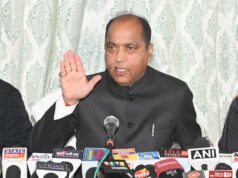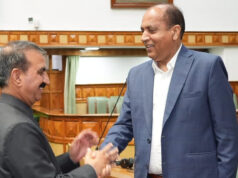Shimla – Leader of Opposition Jairam Thakur has sparked a fresh debate on the Uniform Civil Code (UCC) by asserting that Himachal Pradesh would have implemented the UCC had the Bharatiya Janata Party (BJP) retained power in the state. Speaking to media representatives at his official residence in Shimla, Thakur praised Uttarakhand for becoming the first state in the country to enforce the UCC and congratulated the central leadership and the state government for this achievement.
Thakur stated, “The Uniform Civil Code is the demand of the country today. The BJP has always expressed its commitment to the UCC in its Sankalp Patra, and if we were in power in Himachal Pradesh, the UCC would have been implemented here as well.”
The UCC aims to replace personal laws based on the customs of various religious communities with a unified set of laws governing marriage, divorce, inheritance, and adoption. It is rooted in Article 44 of the Indian Constitution, which directs the state to endeavour to secure a uniform civil code for all citizens.
Proponents argue that the UCC promotes equality and simplifies the legal system, while critics contend it threatens cultural and religious diversity. The implementation of the UCC in Uttarakhand followed recommendations from a committee led by retired Justice Ranjana Prakash Desai, making it a landmark decision.
The BJP has consistently championed the UCC as a step toward gender justice and national integration, describing it as an essential reform for a unified India. Jairam Thakur’s comments reflect the party’s broader narrative of “One Nation, One Law.”
However, opposition parties, including the Congress, have expressed concerns. They argue that the UCC could disrupt India’s pluralistic fabric and question whether the BJP’s push for the UCC is driven more by political motives than genuine reform. Critics highlight potential challenges in achieving consensus and addressing the fears of minority communities.
Uttarakhand’s adoption of the UCC has set a precedent that could influence other states. The move has been lauded by BJP leaders nationwide as a fulfilment of their commitment to equality and modernization. Jairam Thakur’s remarks suggest that Himachal Pradesh might follow suit if political conditions align.
While the UCC is seen as a progressive reform by its advocates, detractors caution against hasty implementation. Concerns include cultural sensitivities, potential infringements on religious freedom, and the logistical challenges of harmonizing diverse personal laws into a single code.
Jairam Thakur’s statement has reignited the debate over the UCC in Himachal Pradesh, reflecting its contentious nature in Indian politics. As Uttarakhand’s experience unfolds, it remains to be seen whether other states, including Himachal, will embrace this reform.









